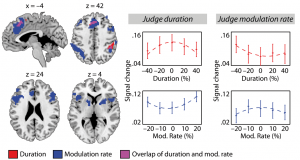Oscillatory Phase Dynamics in Neural Entrainment Underpin Illusory Percepts of Time
Natural sounds like speech and music inherently vary in tempo over time. Yet, contextual factors such as variations in the sound’s loudness or pitch influence perception of temporal rate change towards slowing down or speeding up.
A new MEG study by Björn Herrmann, Molly Henry, Maren Grigutsch and Jonas Obleser asked for the neural oscillatory dynamics that underpin context-induced illusions in temporal rate change and found illusory percepts to be linked to changes in the neural phase patterns of entrained oscillations while the exact frequency of the oscillatory response was related to veridical percepts.
The paper is in press and forthcoming in The Journal of Neuroscience.
Update:
Paper is available online.
References
- Herrmann B, Henry MJ, Grigutsch M, Obleser J. Oscillatory phase dynamics in neural entrainment underpin illusory percepts of time. J Neurosci. 2013 Oct 2;33(40):15799–809. PMID: 24089487. [Open with Read]


